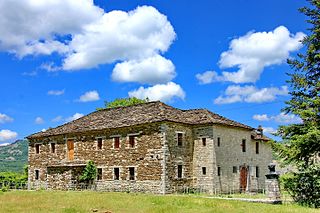
In Albania, World War II began with its invasion by Italy in April 1939. Fascist Italy set up Albania as its protectorate or puppet state. The resistance was largely carried out by Communist groups against the Italian and then German occupation in Albania. At first independent, the Communist groups united in the beginning of 1942, which ultimately led to the successful liberation of the country in 1944.

Kachaks is a term used for the Albanian bandits active in the late 19th and early 20th century in northern Albania, Montenegro, Kosovo and Macedonia, and later as a term for the militias of Albanian revolutionary organizations against the Kingdom of Serbia (1910–18) Kingdom of Yugoslavia (1918–24), called the "Kaçak movement".

The Balli Kombëtar, known as Balli, was an Albanian republican, collaborationist and anti-communist resistance movement during the Second World War. It was led by Ali Këlcyra and by Midhat Frashëri, who is often referred to as the father of Albanian nationalism. The movement was formed by members from the landowning elite, liberal nationalists opposed to communism and other sectors of society in Albania. The motto of the Balli Kombëtar was: "Shqipëria Shqiptarëve, Vdekje Tradhëtarëve". Eventually the Balli Kombëtar joined the Nazi established puppet government and fought as an ally against communist guerrilla groups.

Drenica, also known as the Drenica Valley, is a hilly region in central Kosovo, covering roughly around 700 square kilometres (270 sq mi) of Kosovo's total area (6%). It consists of two municipalities, Drenas and Skenderaj, and several villages in Klina, Zubin Potok, Mitrovica and Vučitrn. It is located west of the capital, Pristina.
The Northern Epirus Liberation Front also called the Northern Epirote Liberation Organization, was an ethnic Greek resistance group that operated in areas of southern Albania during the Italian and German occupation of Albania (1942–1944). The group operated after the withdrawal of the Greek forces from the area, against the invading Italians, Germans and both against the Albanian communist and collaborationist organizations.
Mollas is a village and a former municipality in the Korçë County, southeastern Albania. At the 2015 local government reform it became a subdivision of the municipality Kolonjë. The population at the 2011 census was 1,520. The municipal unit consists of the villages Mollas, Skorovot, Qinam, Vodicë, Qafzez, Helmës, Shtikë, Pepellash, Butkë, Kozel, Milec, Bezhan, Boshanj and Blush.

Sali Butka, was an Albanian nationalist figure, kachak, poet, and one of the delegates of the city of Korçë to the Albanian National Congress of Lushnjë.
Tajar Tetova was an Albanian military commander and çetë (band) leader in southern Albania and Macedonia.

Safet Butka was an Albanian professor, politician and nationalist. Son of famous patriot Sali Butka, he organized the student demonstrations in April 1939 during the Italian invasion and was interned in Ventotene. Upon his return he organized antifascist movements in his native region and was one of the founders of the nationalist organization Balli Kombëtar. Distressed by internal civil war in Albania, he killed himself in 1943.

Qemal Butka was an Albanian architect, painter, politician, and postage stamps engraver. He was mayor of Tirana from 1935-1936 but departed from Albania in 1939 to live in Turkey and later the United States. He is also known for projecting several monuments and buildings in Albania.

Mirash Ivanaj was an Albanian politician, minister and school director, famous for his role in reforming education system in Albania.
The Bulgarian occupation of Albania refers to the occupation of the eastern parts of Albania by the Kingdom of Bulgaria's army during World War I. It lasted from December 10, 1915, when the Bulgarian army crossed the Drin river and entered Albania, until September 9, 1917, when French troops captured Pogradec from the Bulgarian army.

Themistokli Gërmenji was an Albanian nationalist figure and guerrilla fighter. One of the activists of the Albanian National Awakening and the leader of the Albanian irregulars from 1909 to 1914, he became the prefect of police of the Autonomous Albanian Republic of Korçë from 1916 until his execution due to a miscarriage of justice by a French military tribunal in 1917.

Sabri Godo was an Albanian writer, conservative politician and screenwriter. He came from a culture-loving family with deep rooted patriotic traditions. Being brought up in the Totaj family from his mother's side, Godo spent his youth in a literary and patriotic environment.
The Mausoleum of the Albanian Royal Family is a building in Tirana, capital of Albania, which holds the remains of King Zog and other members of his family.

The village of Frashër in southern Albania saw the emergence of several notable families in the history of Albania. They contributed to the independence of Albania throughout military actions but also in literature and politics. The most notable of these families are the family to which belonged Naim Frashëri, national poet of Albania.

Menduh Zavalani (1889–1914) was an Albanian revolutionary and political leader active during the last years of the Albanian National Awakening. He formed his own revolutionary band and was one of the leaders that liberated Përmet and the environs from the Ottoman Empire. Menduh was an appointed delegate from his hometown Korça to the Albanian National Congress that proclaimed the Independence of Albania. In the intellectual level Menduh was noted for the translation of Friedrich Schiller's drama Wilhelm Tell into Albanian. He was assassinated at a very young age near Pogradec by a local collaborationist band.
Tomorrica is a traditional or ethnographic region in Central Albania, located near the border between Berat County and Elbasan County. It takes its name from Mount Tomorr.
Uran Butka is an Albanian writer, historian and politician. The son of Safet Butka and grandson of Sali Butka, he is one of the founding members of the National Association of Political Prisoners. Butka also served as a member of the Albanian Parliament from 1992 to 1997.













